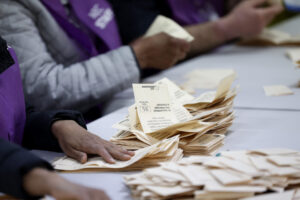“Stitch up” Labor and Coalition Deal on Electoral Reform

Last night, Liberal Senator Jane Hume announced they’d done a deal with the Albanese Labor Government on electoral laws – and some twelve hours later, it became law, having been rushed through both houses of Parliament.
Labor’s compromises with the Coalition have worsened the bill even further:
- Instead of a disclosure threshold of $1,000, which would have revealed cash-for-access payments from lobbyists and corporate interests, the threshold has been raised to $5,000. Since the Albanese Government normally charges between $1,500 and $5,000 for privileged access, expect to see a lot of $4,999 fundraisers in the future. A lobbyist would have to be a repeat customer to have their cash-for-access payments revealed under the higher threshold.
- The Government’s rhetoric of keeping millionaire influence out of politics is looking thin with the increased donation cap of $50,000 (up from $20,000). Since the major parties have nine branches, and they can take four donations per donor every three years, that means a single person or company could give $1.8 million to a major party every election cycle.
- A carve-out for peak bodies means the Business Council of Australia, the Minerals Council of Australia and other lobby groups for vested interests can take up to $250,000 from each member, five times the $50,000 that actual Australian voters are capped at.
It has been a rushed, secretive and dismissive process to pass the laws through Parliament. Last night, the Senate was expected to debate the bill without even seeing what amendments Labor and Liberal had prepared. The biggest changes to election laws in 40 years should have faced proper scrutiny by a multi-party parliamentary inquiry.
The laws do not come into effect until the election after next, around 2028. That means there is still a chance for the next parliament to address the transparency gaps, major party loopholes and unfair treatment of independents and new entrants.
Related research
Between the Lines Newsletter
The biggest stories and the best analysis from the team at the Australia Institute, delivered to your inbox every fortnight.
You might also like
Full preferential voting means you can’t waste your vote
Full preferential voting is a proud Coalition reform – one that benefits every political persuasion Compulsory voting and full preferential voting make up the backbone of Australian democracy, and protect us from voter suppression and disengagement seen in other countries. We owe both to the parties of the centre-right, what would become the Liberal–National Coalition.
The major parties, not the independents are the big spenders at election time
The government says the electoral laws changes are about limiting big spending by independents, but community independents spent less per seat than the major parties at the 2022 federal election.
The election exposed weaknesses in Australian democracy – but the next parliament can fix them
Australia has some very strong democratic institutions – like an independent electoral commission, Saturday voting, full preferential voting and compulsory voting. These ensure that elections are free from corruption; that electorate boundaries are not based on partisan bias; and that most Australians turn out to vote. They are evidence of Australia’s proud history as an
